

Workplace stress. The Stress of Working From Home. While many people regard working from home as a goal for overall work-life balance, those who find themselves actually doing their work from home report higher levels of stress, according to a 2017 study conducted by the United Nations.1 Research on Stress and Working From Home In fact, in this study of 15 countries, including the US, UK, Japan, India, Brazil, Argentina, Belgium, Finland, France, Germany, Hungary, Italy, the Netherlands, Spain and Sweden, it was discovered that 41 percent of "highly mobile" employees (those who more often worked from home) considered themselves highly stressed as well, compared to only 25 percent of those who worked only on-site.
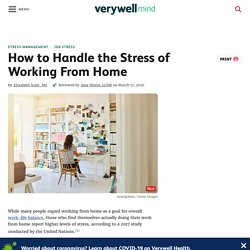
This news may come as a shock to many people who may consider a work-from-home lifestyle to be one that's less stressful and marked with more personal freedom. Likewise with the freedom from dealing with obnoxious co-workers. What Is Stressful About Working From Home? Lack of Structure Too Many Distractions Social Isolation.
10 Causes of Stress (and How to Avoid Them) Ten Ways to De-Stress at Work. One of the secrets of effective stress management at work is finding ways to incorporate a variety of stress-reduction techniques into your workday.
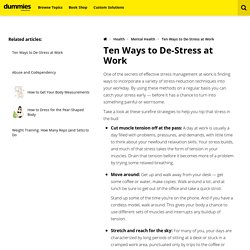
By using these methods on a regular basis you can catch your stress early — before it has a chance to turn into something painful or worrisome. Cut muscle tension off at the pass: A day at work is usually a day filled with problems, pressures, and demands, with little time to think about your newfound relaxation skills. Your stress builds, and much of that stress takes the form of tension in your muscles. Drain that tension before it becomes more of a problem by trying some relaxed breathing. Move around: Get up and walk away from your desk — get some coffee or water, make copies. 9 Simple Ways to Deal With Stress at Work. According to research, the percentage of Americans who are stressed at work is high, and it’s only getting higher.
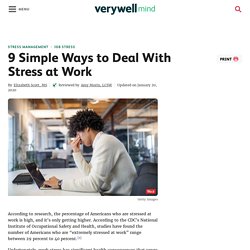
According to the CDC’s National Institute of Occupational Safety and Health, studies have found the number of Americans who are “extremely stressed at work” range between 29 percent to 40 percent.1 Unfortunately, work stress has significant health consequences that range from the relatively benign—more colds and flu—to the more serious, like heart disease and metabolic syndrome.2 But, because stress at work is so common, finding a low-stress job may be difficult or impossible for many people. A more realistic choice would be to simply adopt more effective strategies to reduce stress at work.
Here are some stress management techniques to try. Start Your Day off Right Be Clear on Requirements A factor that contributes to job burnout is unclear requirements. Stay Away From Conflict Stay Organized Be Comfortable Another surprising stressor at work is physical discomfort. 17 Highly Effective Stress Relievers. 10 Relaxing Activities for Destressing at Night. There’s no need for yet another news report talking about how stressful modern life is.
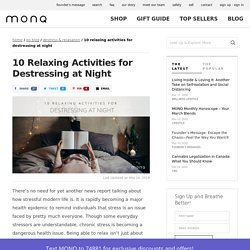
It is rapidly becoming a major health epidemic to remind individuals that stress is an issue faced by pretty much everyone. Though some everyday stressors are understandable, chronic stress is becoming a dangerous health issue. Being able to relax isn’t just about peace of mind, it’s about our health, too! Read on for 10 great activities that can help relieve stress and help you enjoy a much more relaxing stress-free home life. Don’t Skip the Workout Exercise is such an easy thing to put off. Working out itself is not only cathartic. Make it a habit of doing this immediately upon getting home, and you’ll find yourself looking forward to a little sweat and endorphin rush before you veg out for the rest of the night.
Take a Short Walk If you walk at a brisk enough pace, this can even qualify as exercise. Chocolate and Tea Meditation Nobody should be surprised that meditation makes the list. Workplace Stress and Your Health. Effects of stress can affect your physical self. You’re sitting in traffic, late for an important meeting, watching the minutes tick away.
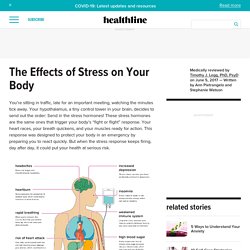
Your hypothalamus, a tiny control tower in your brain, decides to send out the order: Send in the stress hormones! These stress hormones are the same ones that trigger your body’s “fight or flight” response. Your heart races, your breath quickens, and your muscles ready for action. This response was designed to protect your body in an emergency by preparing you to react quickly. Stresses and the lack of plans can cost you money and to be more sick. But other, seemingly more innocuous stressors can prove problematic too.
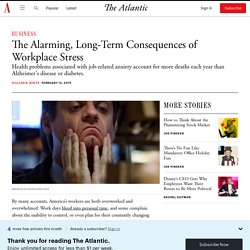
“Decisions about work hours and shift work have profound health consequences, possibly through their effects on work stress, sleep, and the conflict between work and other roles,” according to the researchers. The paper cites several problematic conditions that can arise from an unusual or erratic schedule: Those who worked long hours self-reported more cases of hypertension, for instance. There have also been correlations between occupational injuries and working longer hours during the preceding week. In fact, a 2005 study noted that those who reported high levels of feeling overworked were 20 percent more likely to say that they had made lots of mistakes on the job, which could be especially problematic for those with physically demanding or dangerous positions.
Stress can be channelled into better performances and effectiveness at work. Emma Goldberg Staff Columnist Amidst midterm season, President-elect Peter Salovey has a message for students — stress can be good.
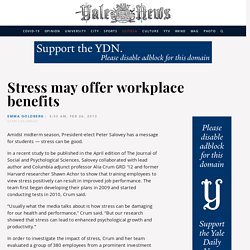
In a recent study to be published in the April edition of The Journal of Social and Psychological Sciences, Salovey collaborated with lead author and Columbia adjunct professor Alia Crum GRD ’12 and former Harvard researcher Shawn Achor to show that training employees to view stress positively can result in improved job performance. The team first began developing their plans in 2009 and started conducting tests in 2010, Crum said. “Usually what the media talks about is how stress can be damaging for our health and performance,” Crum said. In order to investigate the impact of stress, Crum and her team evaluated a group of 380 employees from a prominent investment bank. The researchers also conducted a follow-up study in which they trained 200 managers at an investment bank, helping them channel their stress into improved work effectiveness and efficiency. Good stress immproves different aspects of our lives. We often hear how stress can wreak havoc on the body.

It can cause insomnia and weight gain and increase your blood pressure. But despite the physical effects, many of us live, breathe, and eat stress — not by choice, of course. Stress is sometimes like a black cloud we can’t escape. Even when we think the skies are sunny, stress rears its ugly head, snapping us back to reality. As a long-time anxiety suffer, I have a love-hate relationship with stress. Don’t misunderstand me. 13 Impressive Ways Music Helps Reduce Stress. Nowadays, music has never been so accessible, with all kinds of genres and artists available at a few taps in a search bar.

However, while music is so readily available, not many people realize the benefits that music can have on their lives, especially when it comes to stress. Stress has become an epidemic in our modern-day world and is the leading disability, and reason people are off from work sick. Stress is also extremely harmful to our bodies and minds and regularly leads to serious conditions, such as anxiety and depression. Today, we’re going explore the benefits that music can provide to help you deal with these levels of stress, helping you become a happier You and live the life you want to live. 1. Meditation is renowned for being one of the most popular and most effective practices you can enjoy and partake in to reduce the levels of stress in your life. 2. So, when you’re feeling stressed out or a bit under the weather, why not explore some of these tunes?
3. 4. 5. 6. 7. 8. Exercise and stress: Get moving to manage stress. Exercise and stress: Get moving to manage stress Exercise in almost any form can act as a stress reliever.
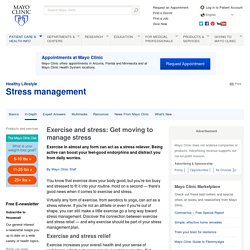
Being active can boost your feel-good endorphins and distract you from daily worries. By Mayo Clinic Staff.